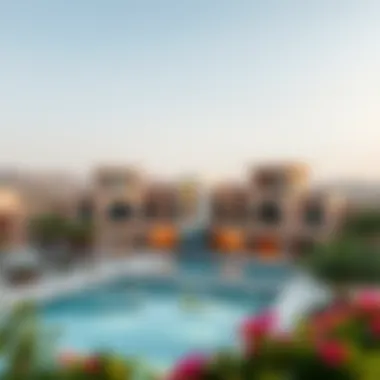Residency Options in the UAE: A Complete Overview


Intro
Navigating the residency landscape in the United Arab Emirates (UAE) can be as intricate as a labyrinth. This guide aims to illuminate the various pathways available for individuals looking to establish residency in this dynamic region. Whether you are an investor pondering property options in Dubai or an expatriate seeking a new beginning, this article provides essential insights into visa categories, application processes, and the impact of residency status on the real estate market.
The UAE is renowned for its economic stability and vibrant lifestyle, making it an attractive destination for people from around the world. As you delve into the nuances of residency permits, it’s crucial to understand how each type of visa meshes with the evolving real estate framework in the UAE.
Thus, whether you are eyeing a long-term stay or simply considering temporary options, this guide serves as your compass. It encapsulates information that is not only useful but critical for making informed decisions. From legal requirements to investment opportunities, let’s embark on this journey to decode the complexities of residencies in the UAE.
Market Insights
Current Trends and Statistics
The real estate market in the UAE continues to evolve, influenced by both local policies and global economic shifts. Recent reports indicate that there has been a surge in demand for properties in Dubai, particularly among expatriates and foreign investors. According to a recent analysis, property transactions in Dubai saw a remarkable increase of approximately 25% in 2022 compared to the previous year. This uptick is largely attributed to favorable residency regulations that have attracted fresh investment.
Investors looking into the UAE find new opportunities, especially in residential properties. Emerging districts like Dubai Creek Harbour and Dubai Hills offer innovative developments catering to modern lifestyles.
"Understanding where the market is headed is crucial for making smart investments. The statistics clearly show that Dubai is not slowing down anytime soon."
Future Predictions and Opportunities
Looking ahead, analysts suggest that the real estate sector in the UAE will continue to thrive, fueled by a robust regulatory framework and ongoing infrastructural development. Programs implemented for golden visas and retirement visas are likely to bolster long-term investments in property.
The focus on sustainability and smart city initiatives presents avenues for innovative developers to explore paired with attractive financing options for investors. Red flags, however, may include fluctuating global economic conditions that could influence rental prices and investment returns. Investors should keep a close eye on such trends as they could impact future decisions.
Property Investment Strategies
Long-term vs Short-term Investments
Deciding on a long-term or short-term property investment strategy hinges on various factors including financial goals, risk appetite, and market conditions.
- Long-term Investments: Typically, these involve purchasing property for rental income or capital appreciation over time. Investors ought to consider how residency affects ownership rights and potential returns.
- Short-term Investments: These may include flipping properties or investing in vacation rentals. In Dubai, for example, short-term leasing can yield significant profits thanks to high tourism rates, but it requires active management.
Understanding the local market can greatly assist in determining the best approach. Research on property types, locations, and target demographics plays a critical role in establishing a successful strategy.
Financing Options and Considerations
When it comes to financing a property in the UAE, one must weigh various options. Many banks and financial institutions offer competitive mortgage packages tailored for both residents and expatriates. Key points to consider include:
- Mortgage Interest Rates: These can vary widely, so it’s essential to shop around.
- Down Payment Requirements: Different properties may have different requirements ranging from 20% to 50% based on location and developer.
- Regulatory Elements: As a resident, understanding your rights when it comes to financing is vital. The legal ramifications concerning property ownership can significantly affect investment decisions.
Overall, total diligence in exploring these aspects will provide a stronger footing for navigating the UAE real estate landscape effectively.
For more in-depth insights into residency options in the UAE, you can refer to this Wikipedia page or explore discussions on platforms such as Reddit.
Understanding Residencies in the UAE
Residency in the United Arab Emirates serves as a critical gateway for individuals aiming to settle, invest, or work in this dynamic region. The sheer diversity of residency options underscores the UAE's commitment to attracting a melting pot of talent. It's not just about living in a different country; it's about being part of a rapidly evolving economic landscape that positions itself as a global nexus for innovation, business, and lifestyle.
Definition of Residency
In the context of the UAE, residency refers to the legal status granting foreign nationals the right to live and work within its borders. This legal standing can be acquired based on various criteria, such as employment, family connections, investment, or entrepreneurship. Essentially, obtaining residency is akin to receiving a ticket to enter a vibrant society enriched with opportunities. A residency permit allows individuals to enjoy a multitude of benefits, including the possibility of wider social integration, access to healthcare services, and even the option to make significant investments, particularly in the booming property market.
Importance of Residency in the UAE
The importance of residency in the UAE cannot be overstated as it encompasses a range of strategic and practical benefits.
- Economic Empowerment: Holding a residency permit is crucial for many expatriates, as it links directly to employment and the ability to earn a living. Employment visas, for instance, not only offer legal work status but also establish a foundation on which individuals can build their careers.
- Investment Opportunities: The UAE’s property landscape is enticing, especially for investors. Residency offers individuals the chance to purchase real estate and contribute to the flourishing local economy. More often than not, acquiring property is a significant motivator for many seeking residency. The potential for capital appreciation and rental income makes this an appealing proposition.
- Cultural Integration: For expatriates, obtaining residency assists in rooting themselves culturally and socially within the UAE. It paves the way for deeper interactions and connections, often leading to a better quality of life and an enriched experience of the local culture, traditions, and lifestyle.
- Legal Rights: With residency comes a clearer legal standing in the UAE, allowing individuals certain rights and obligations that can safeguard their interests. This legal framework ensures that residents can operate within the confines of the law and access essential services without hassle.
In summary, understanding the intricacies of residency in the UAE is not just about the paperwork; it’s about embedding oneself in a region that thrives on innovation and opportunity. As expatriates consider their next steps, grasping the nuances of residency can have profound implications on their lives, financial aspirations, and overall happiness in this vibrant part of the world.
"Residency in the UAE is more than a status, it’s a passport to a rich tapestry of possibilities."
This comprehensive understanding lays the foundation for the subsequent sections, highlighting the different types of residency permits available and their respective benefits, making it imperative for anyone interested in living or investing in the UAE to become familiar with these elements.
Types of Residency Permits
Understanding the various types of residency permits is crucial for anyone looking to settle in the UAE. Each permit serves distinct purposes and comes with its own set of rules and benefits. Knowing which one aligns with your personal or professional circumstances can significantly enhance your experience in this dynamic region.
Employment Visa


An Employment Visa, allowing expatriates to work legally in the UAE, is one of the most common types of residency permits. To obtain this visa, an individual typically needs a job offer from a UAE-based employer who will sponsor the application. This sponsorship includes initiating the visa process by securing a work permit from the Ministry of Human Resources and Emiratization.
- Key Considerations:
- Benefits:
- The employer must maintain a valid trade license.
- The visa is usually tied to the employment contract and can be renewed as long as you remain employed.
- Legal permission to live and work in the UAE.
- Access to local amenities and services like healthcare and education.
Investor Visa
The Investor Visa caters specifically to individuals who want to invest in the UAE’s economy, particularly in sectors like real estate, which is booming. To qualify, one generally must invest a minimum capital, often starting around AED 2 million in property.
- Advantages:
- No local partner required for property ownership when obtaining this visa.
- Potential for long-term residency and stability in business endeavors.
This visa is particularly attractive for investors who seek a stable base for their business operations while enjoying the perks of living in one of the most strategic locations for trade and tourism.
Family Visa
A Family Visa allows residents to sponsor their family members to live in the UAE. This option is often utilized by expatriates who wish to bring their spouse, children, or other dependents along. It’s generally straightforward to set up if you have a valid residency permit and can provide proof of your relationship to those you intend to sponsor.
- Eligibility Requirements:
- Sufficient income to support your family.
- Valid health insurance for your family members.
This visa creates an emotional and social environment conducive to longer-term settlement in the UAE, allowing families to enjoy the diverse culture and opportunities available.
Freelancer Visa
With the growing gig economy, the Freelancer Visa has become increasingly popular. It enables individuals in specific sectors—such as IT, media, and design—to legally work in the UAE without being tied to an employer. Usually, this visa is sponsored by free zones that support freelancers and independent contractors.
- Benefits of Freelancer Visa:
- Considerations:
- Flexibility in terms of work and income.
- Ability to work with multiple clients across different sectors.
- This type of residency is excellent for entrepreneurial spirits and those looking to diversify their income sources.
Retirement Visa
For expatriates aged 55 and above, the UAE offers a Retirement Visa, allowing them to stay and live in the country. To qualify, retirees must show they have a stable income or savings, often specified to hover around AED 20,000 monthly.
- Incentives:
- Open to both expats and individuals wishing to relocate after their working years, creating a community that values experience and legacy.
- The chance to tap into the UAE’s vibrant lifestyle while enjoying a simple process for obtaining residency.
Living in the UAE as a retiree can give those one final adventure in a unique cultural setting, with events, activities, and services tailored for older residents.
"Understanding the types of residency permits can be the difference between thriving and just surviving in the UAE."
Understanding these permits is critical for navigating the UAE's ever-evolving residency landscape. Choosing the right visa can make all the difference in your integration into the community and the opportunities available to you.
Residency by Investment
Residency by investment has carved a niche for itself in the UAE, increasingly attracting a diverse crowd of investors looking to set down roots in this flourishing economy. This section delves into the specifics of residency options that arise through investment, emphasizing their significance in the broader context of the UAE’s immigration landscape. Through this avenue, not only can individuals secure residency, but they also unlock several doors, from business opportunities to favorable living conditions. Understanding the ins and outs of residency by investment is crucial for anyone considering a move to this vibrant region.
Qualifying Investments
In the realm of residency by investment in the UAE, certain investments qualify individuals for residency permits. Primarily, these investments often focus on real estate, though other avenues exist as well.
- Real Estate: To qualify for residency, investors typically need to purchase property worth a minimum of AED 2 million. This doesn’t just buy a roof over one’s head but opens up a world of opportunities, making it an attractive option for many expats. Properties can be brand new or off-plan, allowing for some flexibility.
- Business Investments: Investing in a business within the UAE can also pave the way for residency. Generally, an investment of AED 2 million is required in an established business or startup. This not only grants residency but also allows individuals to actively participate in the thriving UAE business environment.
- Investment Funds: Certain investment funds managed by financial institutions might also qualify. Investors usually need to invest a minimum of AED 2 million in approved funds, thus benefiting from both residency and financial returns.
The emphasis here is mainly on the need for significant financial commitment, reflecting the UAE’s strategy to attract high-net-worth individuals who bring in capital and expertise. As the saying goes, "money talks," and it certainly holds valid in the context of residency by investment.
Benefits of Residency through Investment
Investing in the UAE not only secures a residency permit but also unveils a host of benefits that can significantly impact personal and financial well-being:
- Ease of Movement: Residency holders enjoy the freedom to move in and out of the UAE with greater ease. No need for constant visa renewals or applications – it simplifies travel enormously.
- Business Opportunities: Once residency is obtained, individuals often find networking and setting up a business much smoother. This access to a wealth of connections can be a game changer for investors looking to expand their horizons.
- Family Sponsorship: Residency by investment allows holders to sponsor their family members, ensuring that loved ones can also enjoy the benefits of living in the UAE.
- Potential for Profit: Real estate value typically appreciates over time in the UAE, particularly in sought-after areas like Dubai and Abu Dhabi. This investment can serve dual purposes – as a home and a profitable asset.
- Access to Quality Education and Healthcare: Residency provides access to world-class educational institutions and healthcare services, both of which the UAE is known for. This can be especially important for families prioritizing education and health services.
"Investing in a new land grants you not just a property but a life enriched with opportunities."


Application Process
The application process for residency in the United Arab Emirates (UAE) is a crucial factor that determines not just eligibility, but also the smooth integration into the local socio-economic framework. Understanding this process lays the groundwork for making informed decisions, whether for work, investment, or family reunification. Each step is tightly woven into the legal fabric of the UAE and can significantly affect one's ability to thrive in this dynamic environment.
Step-by-Step Guide
When it comes to applying for a residency permit, stepping through a structured procedure can make all the difference. Here’s a brief outline of the general steps involved:
- Eligibility Verification: Ensure you meet the criteria for your chosen visa type, which could range from work permits to investor visas.
- Gather Required Documents: Prepare and compile all necessary documents; each type of residency will have a distinct set of requirements.
- Application Submission: Submit your application through the appropriate channels, often done through the General Directorate of Residency and Foreigners Affairs (GDRFA).
- Payment of Fees: Most applications will require an upfront payment, so be ready for this aspect early on.
- Await Approval: This phase may vary based on the type and complexity of your application.
- Receive Residency Visa: Upon approval, you’ll receive your residency visa, allowing you to legally reside in the UAE.
By following these steps, applicants can better navigate the nuances of the system, paving the way for a successful transition to life in the UAE.
Required Documents
The complexity of the document requirements can be a headache, but having everything in order is half the battle won. Here’s a general list of documents one might need, though specifics can vary based on the visa category:
- Passport Copy: A clear copy of your passport, which should have at least six months’ validity left.
- Passport-Sized Photos: Usually, multiple recent photographs adhering to the UAE’s specifications.
- Proof of Employment: This can include employment contracts or letters from your employer, confirming your role in the UAE.
- Financial Statements: Particularly relevant for investor and freelance visa applications; proof of funds can show your financial stability.
- Medical Records: Depending on the residency type, proof of health insurance and medical fitness might also be required.
- Educational Qualifications: For professionals, degrees and certifications should be attested and recognized by local authorities.
Keeping these documents ready can expedite the application process; disorganized paperwork can lead to unnecessary delays.
Application Fees and Processing Times
Another critical aspect to consider is the financial commitment involved in the application process. Here’s what you need to know about fees and how long you might expect to wait:
- Fees: Residency visa fees can vary widely. For example, an employment visa application fee could range from AED 500 to AED 3,000, depending on the employer's classification and the applicant's qualifications. Investor visas might involve higher fees, reflecting the substantial financial commitment they represent.
- Processing Times: Generally, the processing time for residency applications can range from a few days to several weeks. This can be influenced by factors like the type of visa, the completeness of your application, and even the current workload of the immigration authorities. For families applying under a Family Visa, expect the timeline to stretch a bit longer due to additional checks.
***="Efficiency in your application can considerably shorten processing times, impacting your plans to settle or invest in the UAE."
Residency Renewal and Cancellation
Residency in the UAE is not just a one-time affair; it’s a dynamic process that requires attention to detail and timely actions. Renewing or even cancelling your residency can have significant implications on your legal status, property ownership, and overall life in the Emirates. Understanding how these processes work is crucial for anyone looking to navigate the complexities of living and investing in this vibrant region. The importance of knowing the ins and outs of both renewal and cancellation cannot be overstated, especially when it comes to maintaining a smooth expatriate experience.
Renewal Process
The renewal of a residency visa is an essential task that ensures continuous legal residency in the UAE. Typically, residents must begin this process at least 30 days before their visa expires. The key steps include:
- Submission of Documents: Gather necessary documents, including your original passport, residency visa, and health insurance certificate. For family visas, you’ll also need proof of family ties.
- Medical Fitness Test: Depending on your visa type, you may be required to undergo medical tests to ensure you don't carry contagious diseases.
- Payment of Fees: Once the documents are sorted, you need to pay renewal fees at the relevant immigration office. This fee might vary based on the visa type.
- Waiting Period: After submitting your application, there may be a short waiting period during which the immigration department processes your renewal request. Usually, this takes a few days.
- Collect New Visa: Finally, upon approval, collect your new residency visa. Ensure all details are correct—any discrepancies could lead to future complications.
Renewal is not just some bureaucratic hurdle; it’s a crucial part of securing your right to live and work in the UAE. Missing the renewal deadline can lead to fines or even a visa cancellation, putting you in a precarious situation.
Always be proactive. Establish reminders to keep track of your residency status and avoid any last-minute scrambles.
Circumstances of Cancellation
Not all residents end their stay in the UAE by simply renewing their visas. Sometimes, various circumstances can lead to a cancellation of residency. Understanding these situations is just as essential as knowing how to renew. Here are some common reasons for visa cancellation:
- Employment Changes: If you leave your job or are terminated, your employer is often required to cancel your visa. Without a valid sponsor, residency cannot be maintained.
- Expiry of Residency: Ignoring the renewal process can inadvertently lead to cancellation. If your residency visa expires without renewal, it's automatically cancelled.
- Violation of Visa Terms: Engaging in activities not permitted under your visa can result in cancellation. For instance, a work visa must not be used for tourism purposes.
- Personal Choices: Many residents decide to return to their home country for personal reasons—this can often involve a resignation letter from their employer to process the cancellation.
- Legal Issues: Encountering significant legal troubles can also necessitate a cancellation, particularly if a resident is convicted of serious offenses.
It's vital to understand that cancellation impacts more than just residency status. If you own property or have investments, these can be affected. Moreover, leaving the UAE without proper cancellation can lead to fines or restrictions on future entries.
Impact of Residency on Property Ownership
Understanding the relationship between residency and property ownership in the UAE is crucial for anyone considering investing in the region's lucrative real estate market. Residency status not only opens the doors to investing in property but also comes with a set of rights and responsibilities. For investors and expatriates, grasping these nuances can make a significant difference in securing their financial future in the UAE.
Legal Rights and Obligations
When it comes to owning property in the UAE, residency plays a pivotal role in defining legal rights. For instance, holders of specific residency permits like the Investor Visa or the Freelancer Visa can purchase property in designated areas, often known as freehold developments. These areas allow foreign investors to own property outright, without restrictions, as outlined in the Property Law No. 7 of 2006.
Key Rights for Property Owners:
- Ownership: Residency allows for full ownership rights in designated areas.
- Property Registration: All properties must be registered with the Dubai Land Department (DLD). This process ensures legal recognition and safeguards ownership rights.
- Lease Agreements: Residency status enables property owners to enter into leases, whether residential or commercial, underpinning their investment.
Obligations to Consider:
- Renewal: Residents need to ensure their residency permits are current, as lapses could jeopardize their property holdings.
- Compliance with Local Laws: Property owners must adhere to regulations concerning property maintenance, tenant rights, and local zoning laws. Not knowing the law is not an excuse; ignorance could lead to penalties or worse.
- Financial Responsibilities: Ownership entails various costs, such as maintenance fees and property taxes, where applicable.
Understanding these rights and obligations is essential. As the saying goes, knowledge is power, and it's doubly true in real estate where missteps can be costly.
"It is not enough to own property; one must navigate the landscape of laws that govern it.”
Residency and Mortgage Eligibility


Securing a mortgage in the UAE presents a different kind of challenge and opportunity, closely tied to one’s residency status. Financial institutions typically favor residents when it comes to approving mortgage applications. Being a resident often indicates stability and a commitment to remaining in the country, which banks view as a plus.
Key Considerations for Mortgage Eligibility:
- Income Stability: Lenders usually require proof of income. A stable job in the UAE is a key factor in qualifying for a mortgage.
- Residency Status: Certain types of residencies, notably long-term ones, may have better chances of approval compared to short-term permits.
- Creditworthiness: Banks will evaluate your credit history and score to gauge your ability to repay the loan.
Mortgage Types Commonly Available to Residents:
- Fixed Rate Mortgages: Offers a consistent interest rate over the entire term, making budgeting easier.
- Variable Rate Mortgages: Initial rates may be lower, but they fluctuate based on market conditions.
- Islamic Financing Options: These are popular among various residents, offering an alternative that complies with Sharia law.
Investors should proactively engage with multiple banks and financial institutions to understand their options. Sometimes, an ounce of prevention is worth a pound of cure; gathering various offers will ultimately lead to making the best financial decision.
By grasping the impacts of residency on property ownership and mortgage eligibility, prospective investors place themselves at an advantageous position to navigate the property markets within the UAE.
Living Conditions and Lifestyle in the UAE
Understanding the living conditions and lifestyle in the UAE is paramount for anyone considering residency in this vibrant nation. The UAE offers a unique blend of modernity and tradition, providing a rich tapestry of experiences that appeal to expatriates, investors, and locals alike. Aspects such as cultural integration and the cost of living significantly shape the daily lives of residents and are key factors influencing their decisions.
Cultural Integration
Cultural integration is not just about coexisting in a foreign land; it’s about weaving oneself into the local fabric. The UAE is a melting pot of cultures, with a significant percentage of its population being expatriates from all over the globe. Arabic is the official language, and understanding even basic phrases can be beneficial. It shows respect and often paves the way for deeper connections.
Participating in local festivals, such as Ramadan and Eid, provides an authentic glimpse into the emotional core of Emirati life. These events allow expatriates to mingle and bond over shared experiences, facilitating a smoother transition into their new environment. Furthermore, the UAE government actively promotes cultural events and exchanges, providing platforms where expatriates can showcase their heritages while embracing Emirati traditions.
However, cultural integration comes with its own challenges. The UAE’s laws and social norms can be quite different from those in many Western nations. Understanding these regulations is crucial, as certain behaviors are considered offensive. For example, public displays of affection are typically frowned upon. Exhibiting cultural sensitivity not only enhances personal relationships but also strengthens the community.
Cost of Living Insights
Navigating the cost of living in the UAE involves understanding the price of housing, utilities, and everyday expenses, which can vary significantly from one emirate to another. Dubai and Abu Dhabi tend to have higher living costs than your average emirate, but they also offer better job opportunities and lucrative business ventures.
- Housing: Rent prices can bite into your budget. While one might find more affordable options in Sharjah, areas like Downtown Dubai are quite pricey. It's crucial to assess your financial capability and lifestyle preferences before settling down.
- Utilities: The cost of electricity and water can add up, particularly during the sweltering summer months. Familiarizing oneself with energy-efficient appliances ensures you keep those nagging bills at bay.
- Food and Dining: Eating out can be costly, especially in high-end restaurants. However, local eateries and supermarkets offer reasonable choices for those who wish to keep their spending in check.
- Transportation: Public transport such as the Dubai Metro is efficient and budget-friendly. Owning a car may be more convenient, but fuel prices are generally low compared to many countries.
Making sense of these expenses is vital for anyone looking to maintain a comfortable lifestyle while living in the UAE. Determining a realistic budget beforehand, and being aware of various financial commitments, will surely aid in adapting to the local lifestyle more harmoniously.
"A penny saved is a penny earned." This old adage rings particularly true as budgeting in the UAE can lead to financial comfort, enabling a fulfilling and enriching expatriate experience.
Overall, adapting to the living conditions and lifestyle in the UAE involves balancing respect for local culture with the practicalities of daily living. Making informed decisions and staying aware of available resources will provide the foundation for a rewarding experience.
Future Trends in UAE Residency Policies
The landscape of residency in the UAE is continuously changing, reflecting broader global trends, economic shifts, and the dynamic aspirations of a diverse population. Understanding the future trends in residency policies is crucial for prospective residents, investors, and various stakeholders in the property market. These trends not only provide insights into the legal landscape but also herald the benefits of adaptability for those looking to make the UAE a long-term base.
Regulatory Changes
The UAE government is known for its progressive approach to residency policies, often introducing regulatory changes aimed at attracting foreign investment and talent. Recent announcements reflect a clear shift towards more flexible residency options. For instance, the introduction of long-term visas and simplified processes for residency renewal signifies a commitment to making the country more hospitable for expatriates.
Consider the introduction of the golden visa program, which allows investors and talented individuals to reside in the UAE for up to ten years. These kinds of regulatory changes are emblematic of the UAE's strategy to encourage individuals with unique skills to take root in the nation. Such measures not only enhance UAE's competitive edge globally but also cultivate a richer tapestry of professions within the workforce.
As regulations evolve, potential applicants need to keep a keen eye on these developments. Ignoring these changes can lead to missed opportunities. For instance, staying updated on regulations that pertain to family sponsorship or modifications to investment requirements can significantly impact an individual's planning.
"Regulatory adaption within residency policies reflects greater economic foresight and intent to enhance lifestyle for expatriates in the UAE."
Influence on Property Market
Changes in residency regulations inevitably impact the property market. When residency options become more accessible and appealing, it drives demand for residential properties. A notable effect has been witnessed with the introduction of the two-year renewable visas tailored for freelancers and remote workers, which has sparked an emerging trend in co-living spaces and serviced apartments.
By offering various kinds of residency permits, the UAE caters to a broader demographic, thereby attracting a diverse range of investors and residents. Such inclusivity, in turn, fuels the demand for real estate, which stabilizes and grows the property market.
Moreover, legislative modifications intended to boost foreign ownership have raised interest among overseas investors. With clear pathways leading to residency through property investment, many buyers view real estate not just as an investment but also as a means to secure a lifestyle upgrade in one of the world's most popular expatriate destinations.
Overall, the interplay between residency trends and the property market is quite significant. Those involved—be it developers, realtors, or investors—need to analyze how these shifts can benefit them, ensuring they are well-positioned to meet the demands of an evolving buyer profile. As the UAE's residency policies continue advancing, the implications for the property market will be both critical and far-reaching.
End
In this article, we have deeply explored the multifaceted landscape of residencies in the UAE. Understanding residency isn't just about residing in a new locale; it encompasses various nuanced elements that can significantly affect both lifestyle choices and investment decisions. The UAE is not just a melting pot of cultures, but a thriving hub that offers a myriad of opportunities for expatriates and investors alike.
Summary of Key Points
- Types of Residency Permits: Various visas cater to distinct needs, whether it's through employment, investment, family ties, or independent careers.
- Application Process: The residency application can seem daunting, but following the step-by-step guide streamlines this complex procedure, ensuring all required documents and fees are addressed properly.
- Renewal and Cancellation Basics: Staying informed about the renewal cycles and potential cancellation scenarios helps one maintain legal residency status without hiccups.
- Impact on Property Ownership: Residency permits directly influence one’s legal rights and responsibilities in property investments, making this a crucial consideration for potential buyers.
- Future Trends: Monitoring changes in residency policies can enhance one’s understanding of the property market, as well as personal investment strategies.
Final Thoughts on Residency in the UAE
Residency in the UAE is layered and intricate. It opens doors not only to a new home but also to a vibrant lifestyle filled with opportunities for investment and professional growth. The benefits of understanding the residency landscape are immense—ranging from securing the right type of visa to optimizing property investments in Dubai's ever-evolving market.
Navigating this terrain requires diligence and insight. By keeping abreast of changes and maintaining a proactive approach, expatriates and investors can position themselves advantageously in this dynamic environment. With the right knowledge and resources, residency in the UAE can lead to rewarding experiences that often go beyond mere living arrangements.
"A house is made of bricks and beams. A home is made of hopes and dreams."















